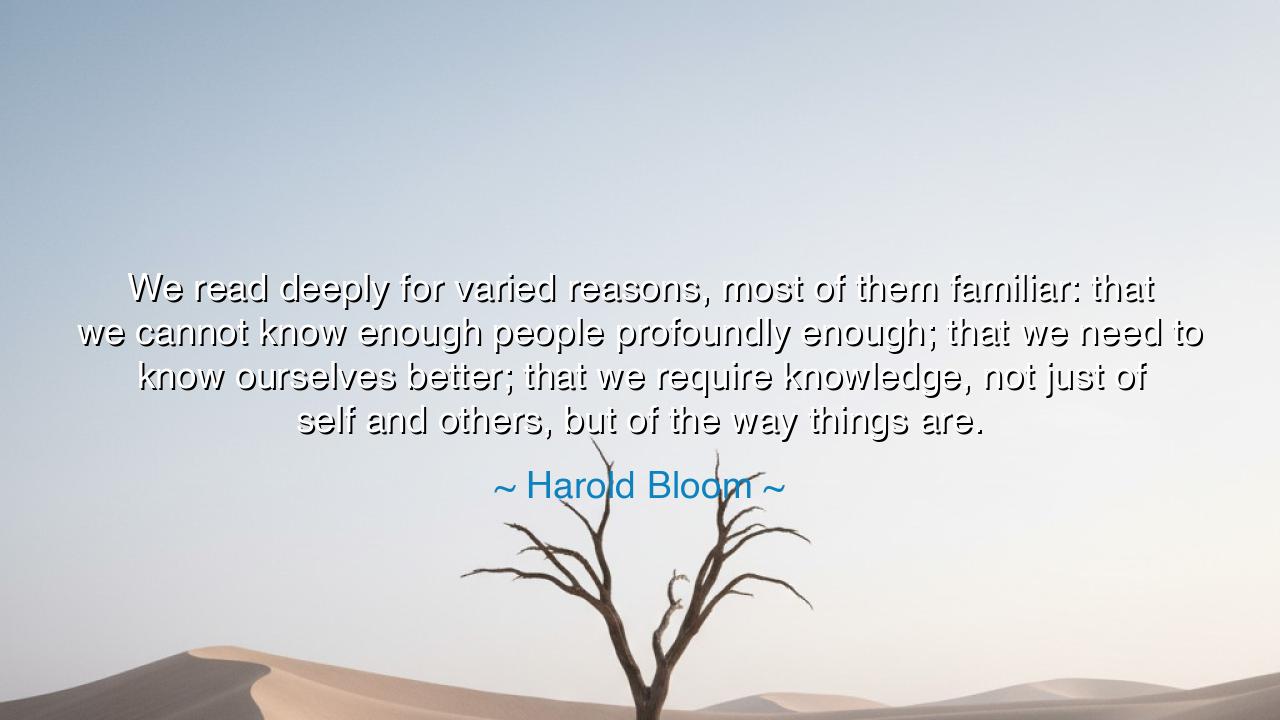
We read deeply for varied reasons, most of them familiar: that we
We read deeply for varied reasons, most of them familiar: that we cannot know enough people profoundly enough; that we need to know ourselves better; that we require knowledge, not just of self and others, but of the way things are.






Hear the words of Harold Bloom, the great guardian of literature, who declared: “We read deeply for varied reasons, most of them familiar: that we cannot know enough people profoundly enough; that we need to know ourselves better; that we require knowledge, not just of self and others, but of the way things are.” These words speak to the eternal hunger of the human soul—the yearning to see more, to feel more, to understand more than life alone can grant us. For life is short, and the number of souls we may touch in a single lifetime is few, yet through reading we may live a thousand lives, and see with a thousand eyes.
Bloom reminds us that reading deeply is not idle entertainment but a sacred act, a communion with minds across ages and lands. Through books we converse with the dead, hear their wisdom, and inherit their struggles. We cannot meet Homer, Shakespeare, or Tolstoy in the flesh, yet their souls speak to us still. In their words we know more people than time allows us, and through their creations we glimpse the depths of human longing, folly, triumph, and despair. Thus reading becomes a way to expand our circle of life until it includes the entire human family.
But Bloom also tells us that we read to know ourselves. For how can one see the truth of the heart without a mirror? And literature is the greatest mirror, showing us our desires, our fears, our hidden shadows, and our noblest heights. Consider Augustine, who, when reading the scriptures, found his own soul laid bare; or Virginia Woolf, who confessed that novels gave her back her very sense of being alive. When we read, we do not merely escape into another’s world—we return with sharper eyes to our own.
History gives us a powerful example in Abraham Lincoln, who as a poor boy had little schooling but devoured every book he could find. In Shakespeare he found the depths of human ambition; in the Bible, the measure of justice and mercy. Through reading, he gained not only the wisdom of others but also a deeper vision of himself. And when he rose to lead his nation through its darkest trial, his words bore the cadence of the great texts he had absorbed. His story shows that to read deeply is to prepare the soul for greatness.
Yet Bloom takes us further still: he tells us that we read to know the way things are. For life is tangled, full of contradictions and mysteries. Literature does not always comfort us; often it unsettles us, showing us the harshness of fate, the cruelty of power, the fleetingness of joy. But in this honesty lies wisdom. For when we see reality reflected in its fullness, we are less deceived by illusion, less fragile before suffering, and more awake to beauty. To read is to train the heart to dwell in truth.
The lesson is clear: do not read only for amusement, nor only for knowledge of facts. Read to live more deeply. Read to know others in their fullness, to see yourself with clarity, and to discern the nature of the world. Let your reading not be shallow, but profound—choose books that challenge, that unsettle, that stir the soul to thought. Make time for this sacred practice, for without it the heart grows narrow, and the spirit forgets its vastness.
So I say to you: read as if your very life depends on it—for in truth, it does. Each book you open is a doorway; each page is a bridge. Walk through them, and you will find not only the voices of others but also your own soul speaking back to you with greater strength. As Harold Bloom taught, reading deeply is a path to human fullness, a way to expand your being until it touches the eternal.
Thus shall his words endure: we read deeply not only for knowledge, but for life itself. In the pages of books we find the map of the human spirit, and by following it, we become more than we were—we become wholly, profoundly, unforgettably human.






AAdministratorAdministrator
Welcome, honored guests. Please leave a comment, we will respond soon